Those who cannot remember the past are condemned to repeat it.
George Santayana
(all photographs from Haiti Infos’ archives and from public sources)

Handpicked by the U.S, Haitian president Sudre Dartiguenave(1915-1922) surrounded by U.S marines
U.S. marines occupied Haiti from 1915 to 1934. By 1919, Haitian Charlemagne Péralte had organized more than a thousand cacos, or armed guerrillas, to militarily oppose the marine occupation. The marines responded to the resistance with a counterinsurgency campaign that razed villages, killed thousands of Haitians, and destroyed the livelihoods of even more. American organizations such as the NAACP opposed the U.S. occupation of Haiti. They sent delegations that investigated conditions and protested the blatant racism and imperialism of U.S. policy in Haiti in the early 20th century. An article from 1920, by NAACP leader James Weldon Johnson, countered the standard justifications for U.S. occupation of Haiti.
In writing of my visit to Haiti for Crisis readers, I should like to tell all that I learned about political, economic and social conditions there, and to give, as well, the information and impressions I gained about the country and the Haitian people themselves. This, of course, will not be possible, for either of these phases of the subject, fully treated, would make a complete article. I have decided that something about each phase will be more interesting and more comprehensive than all about one. Therefore, what I say will of necessity be rather sketchy.
The Historic Background
U.S secretary of State William Jennings Bryan
commenting on the Haitian elite during the occupation, he
made this statement which pretty much summarizes his
country’s attitude towards Haiti and the Haitians :
« My my, imagine that, niggers speaking french ».
I should like the reader, first of all, to take a swift glance at the historical and cultural background of the Haitian people. In order to fully understand present and actual conditions, it is necessary to be familiar with the fact that the Haitian people have a glorious history behind them. Haiti was the first of the American Republics, after the United States, to gain its independence. The story of the war for Haitian independence is one of the most thrilling chapters in the history of the world. If one reads only what alien historians have written, he gains the idea that the Haitian struggle was nothing more than the massacre of outnumbered whites by hordes of semi-savage blacks. There was massacre and savagery but it was on both sides. But the war itself was one which suffers very little in magnitude by comparison with the American Revolution. There were times when the French troops and the Haitian troops engaged, aggregated more than 80,000 men. The French troops were the best that Napoleon could send. The Haitian troops were not a band of lawless guerrillas but were well drilled and well officered. There were battles in which these troops compelled the admiration of the French for their valor, and their commanders, for their military ability and gallantry.
It should also be borne in mind that the Haitian Revolution was not merely a political revolution. It was also a social revolution. There was a complete overturn of both the political and social organization of the country. The man who had been the chattel became the ruler. The great estates of the colonial slave holders were cut up into small parcels and allotted among the former slaves. This last fact has a direct bearing on present conditions in Haiti, to which I shall refer later.
Haiti gained her independence 116 years ago and maintained her complete sovereignty down to 1915, the year of American intervention. None of the Latin-American Republics had the difficulties in maintaining their independence that Haiti encountered. The Black Republic did not receive from the United States the support which it had a right to expect. Haiti had fought France, England and Spain, but the United States was the last of all the strong nations to recognize her independence, when, indeed, she should have been the first.
Christophe
King Henri Christophe
Even intelligent colored Americans are apt to feel indulgent or embarrassed over the subject of Haitian history. No doubt many of them have smiled or felt ashamed at the generally accepted story about King Christophe in his palace at Sans Souci and his court of dukes and counts. The popular picture of Christophe’s court is that of a semi-savage ludicrously playing at king, surrounded by a nobility that took their titles from the names of things they liked best to eat and drink. Christophe was a remarkable man, and a ruler of great intelligence and energy. He declared himself king because he felt that most could be accomplished for Haiti under the strongest possible form of government. Under his direction, the northern part of Haiti underwent great development. I visited Christophe’s palace at Sans Souci. It has fallen into ruins, but there is still enough left to show that it was indeed a palace. The buildings and grounds were copied after the palace at Versailles, and were constructed by the best European architects and builders. There is no doubt that when it was erected, it was the most palatial residence on the western hemisphere.
But a yet more wonderful testimony of Christophe’s energy and greatness is the citadel which he built with the idea of its being the last stronghold against the French if they should attempt to reconquer Haiti. He built this citadel on the top of a mountain more than three thousand feet high, which towered up above his palace at Sans Souci, and dominated the fertile plains of northern Haiti which stretch around for miles. I made the trip to the citadel. The journey requires more than two hours on horseback up a narrow and precipitous mountain path. After I had ridden for an hour and a half, I reached a sudden turn in the path and caught the first view of the structure. The sight was amazing. It was dumbfounding. I could hardly believe my own eyes. There, from the pinnacle of the mountain, rose the massive walls of solid brick and stone to a height of more than one hundred feet. On three sides of the citadel the walls are sheer with the sides of the mountain. The other side is approached by the path.
This path, Christophe had commanded by fifty solid brass cannons, each one about thirty feet long. How he got these guns up to the top of the mountain nobody seems to know. The Haitian Government has had offers for them as metal, but nobody seems to know how to get them down. Getting them up was a super-human accomplishment, as it is not an easy matter to get up to the citadel with an ordinary basket of lunch. I spent more than two hours going through this vast fortress without pausing a moment, and the more I saw of it, the more the wonder grew on me not only as to the execution but the mere conception of such a work. In many places the walls are from eight to twelve feet thick. An idea of its size may be gained from the fact that it was built to quarter 30,000 soldiers. It is the most wonderful ruin in the western hemisphere, and for the amount of human energy and labor sacrificed, can well be compared to the pyramids of Egypt. As I stood on the highest point, where the sheer drop from the walls was more than 2,000 feet, and looked out over the rich plains of northern Haiti, I was impressed with the thought that if ever a man had the right to feel himself a king, that man was Christophe when he walked around the parapets of his citadel.

It is a people of Negro blood, who have produced a Christophe and a Dessalines, who have given to the world one of its greatest statesmen, Toussaint L’Ouverture, who have behind them a history of which they have every right to be proud, that are now threatened with the loss of their independence; that have now fallen not only under American political domination, but under the domination of American prejudice. Haiti is ruled today by martial law dispensed by Americans. There are nearly three thousand American Marines in Haiti, and American control is maintained by their bayonets. In the five years of American Occupation, more than three thousand innocent Haitians have been slaughtered.
There are three grounds on which the attempt is made to justify American intervention and the military occupation of Haiti. The first is that such a state of anarchy and bloodshed had been reached as could no longer be tolerated by the civilized world; the second, that the Haitians have demonstrated absolute unfitness to govern themselves; and the third, that great benefits have been brought to Haiti by American control.
Alleged Anarchy
President Vilbrun Guillaume Sam
As to the first: The United States Government has wished to make it appear that it was forced on purely humane grounds to intervene in Haiti because of the tragic overthrow and death of President Vilbrun Guillaume Sam, July 27–8, 1915, and that this government has been compelled to keep a military force in Haiti since that time to pacify the country maintain order. The fact is that for nearly a year before the coup d’état which overthrew Guillaume, the United States had been bringing pressure on Haiti to compel that country to submit to American control. Three diplomatic attempts had been made by three different missions. It was in May, 1915, that the third attempt was made. The United States sent to Haiti Mr. Paul Fuller, Jr., with the title “Envoy Extraordinary”, on a special mission to apprise the Haitian Government that the Guillaume Administration would not be recognized by the United States unless Haiti agreed to sign a covenant similar to the one which this country had with Santo Domingo. The two governments were interchanging views on this proposition when the events of July 27–8 took place.
On July 27, President Guillaume fled to the French Legation. On the same day, political prisoners in the prison at Port-au-Prince were executed. On the next morning, Guillaume was killed, and that afternoon, an American man-of-war dropped anchor at Port-au-Prince and landed American forces. Immediately after the killing of Guillaume, Port-au-Prince was as quiet as though nothing had happened, and it should be borne in mind that through it all, the life of not a single American citizen had been taken or jeopardized. The overthrow of Guillaume and its attending consequences did not constitute the cause of American intervention in Haiti; it merely furnished an opportunity for which this government was waiting. There never have been the grounds for intervention in Haiti that there have been in Mexico.
Fitness To Rule

Parade of US marines in Port-au-Prince
The unfitness of the Haitian people to govern themselves has been the subject of propaganda for the last century. Books and pamphlets and articles have been written, and lectures have been delivered many times over to prove that the Haitians not only were incapable of advancement, but were steadily retrograding into barbarism. An observation of the city of Port-au-Prince is sufficient to refute this oft made assertion. Port-au-Prince is a clean, well paved, well lighted city. Its newer business buildings are constructed of concrete and brick. The wooden shanties which one so often sees in magazines and books illustrating the business section of the town are relics of the old French régime. The residential section of Port-au-Prince is built on the slopes of the hills that rise back of the city. The homes of the well-to-do people are beautiful villas with well kept grounds, and there are hundreds of them.
This section of Port-au-Prince is superior to the residential section in any of the cities of the Central American republics. In fact, Port-au-Prince is one of the most beautiful of the tropical cities which I have seen. Haiti has been independent for more than a century and if the people had been steadily retrograding into barbarism during all of that time, Port-au-Prince today would be an aggregation of filth and decay instead of the city that it is. In Port-au-Prince one will meet Americans who, in response to the exclamation, “Why I am surprised to see what a fine city Port-au-Prince is!” will answer, “Yes, but you should have seen it before the Occupation.” The implication here is that the American Occupation is responsible for making Port-au-Prince a paved and well kept city. It is true that only one or two of the principal streets of Port-au-Prince were paved at the time of the intervention—five years ago—but the work had already been begun and contracts for paving the whole city had already been let by the Haitian Government. The American Occupation did not pave, and had nothing to do with the paving of a single street in Port-au-Prince. The regulations instituted by the American Health Officer may have something to do with the regularity with which the streets are swept, but my observation showed me that the Haitians have a “sweeping habit” which they must have acquired long years before the American Occupation.

U.S. marines hunting down Cacos in the mountains
I made a five-day trip through the interior, traveling day and night in an automobile. I noticed in the early morning hours, as I passed cabin after cabin in the rural districts, the women carefully sweeping the yards until they were as clean as a floor. In fact, nowhere in the rural districts of Haiti did I see the filth and squalor which may be observed in any backwoods town in our own South.
The smaller cities of Haiti are replicas of Port-au-Prince. Whatever the Haitians may not be, they are a clean people. Many may be dressed in rags and tatters, but the rags and tatters are periodically washed. A filthy Haitian is a rare exception. On this point, I recall a remark made by a white American who conducts one of the biggest mercantile businesses in Haiti. He was speaking to me about the cleanliness of the Haitians and he made an observation which struck me quite forcible. He showed me statistics to prove that Haiti imports more soap per capita than any country in the world. He told me that three of the largest soap manufacturers in the United States maintain headquarters at Port-au-Prince.
Demonstration against American occupation
Another point in the propaganda which has been so long circulated to prove the unfitness of the Haitians, is the statement that the people are congenitally and habitually lazy. Not long ago I saw a magazine article on Haiti, and one of the illustrations was a picture of a Haitian man lying asleep in the sun, and under it was the title “the Favorite Attitude of Haiti’s Citizens.” I would wager that the photographer either had to pay or persuade his subject to pose especially for him, because in all of my six weeks in Port-au-Prince, I never saw anybody lying around in the sun asleep. On the contrary, the Haitians are quite a thrifty people. What deceives some observers is the fact that their methods are primitive. The mistake is often made of confounding primitive methods with indolence.
Anyone who travels the roads of Haiti will be struck by the sight of scores and hundreds and even thousands of women, boys and girls filing along, mile after mile, with the produce of their farms and gardens on their heads, or loaded on the backs of animals, to dispose of them in the markets of the towns. I do not see how anyone could accuse such people of being lazy. Of course, they might market their stuff more efficiently if they had automobile trucks; they have no automobile trucks, but they are willing to walk. For a woman to walk eight or ten miles with a bundle of produce on her head which may barely realize her a dollar is, undoubtedly, a wasteful expenditure of energy, but it is not a sign of laziness.

Port-au-Prince during the occupation,circa 1928
The Haitian people have also been accused of being ignorant and degraded. They are not degraded. I had ample opportunity to study the people of the cities, and the people of the country districts, and I found them uniformly kind, courteous and hospitable, living in a simple and wholesome manner. The absence of crime in Haiti is remarkable, and the morality of the people is strikingly high. Port-au-Prince is a city of more than 100,000, but there is no sign of the prostitution that is so flagrant in many Latin-American cities. I was there for six weeks and in all that time, not a single case of a man being accosted by a woman on the street came to my attention. I heard even from the lips of American Marines tributes to the chastity of the Haitian women.
The charge that the Haitians are ignorant is only partly true. They are naturally quick witted and have lively imaginations. The truth, however, is that the great mass of the Haitian people are illiterate. They are perhaps more illiterate than the people of any Latin-American country, but there is a specific reason for this. For a reason which I cannot explain, the French language in the French-American colonial settlements containing a Negro population divided itself into two branches—French and Creole. This is true of Louisiana, Martinique and Guadeloupe, and also of Haiti. The Creole is an Africanized French, and must not be thought of as a mere dialect. The French-speaking person cannot, with the exception of some words, understand Creole unless he learns it. Creole is a distinct language, a graphic and very expressive language, and in some respects, is, for Haiti, a language superior to French.

The upper Haitian classes, say approximately 500,000, speak French, while the masses, probably 2,000,000, speak Creole, and though Haitian Creole is grammatically constructed, it has not been generally, reduced to writing. Therefore, these 2,000,000 people have no way of communication through the written word. They have no books to read. They cannot read the newspapers. They cannot communicate with each other by writing. The children of the masses study French the few years they spend in school, but French never becomes their every-day language. In order for Haiti to abolish illiteracy and thereby reduce the ignorance of her masses, Creole must be made a written, as well as a spoken language for I feel that it is destined to remain the folk language of the country. This offers a fascinating task for the Haitian intellectuals. Before I left, I talked with a group of them concerning it.
I had the opportunity of being received into the homes of the cultured and wealthy people of Port-au-Prince, to attend several of their social affairs and to visit the clubs. Even the most prejudiced writers of Haiti have had to make an exception of this class of Haitians, for they compel it. The majority have been educated in France. They have money. They live in beautiful houses. They are brilliant in conversation and know how to conduct themselves socially. The women dress in fine taste, many of them importing their gowns directly from Paris. Refined people from no part of the world would feel themselves out of place in the best Haitian society. Many of these women are beautiful and all of them vivacious and chic. I was deeply impressed with the women of Haiti, not only the society women, but the peasant women. I should like to give my impressions, but space will not allow.
American “benefits”
Haitian Cacos leader Charlemagne Peralte was
betrayed by a haitian named Jean-Baptiste Conze , ambushed
and killed by the US marines
The third ground offered as justification is that great benefits have been brought to Haiti by American control. I made an honest effort to find out what things the Americans have done for the benefit of Haiti, during the five years of Occupation. I found that only three things could be advanced, and they were: The Improvement of the public hospital at Port-au-Prince; enforcement of rules of modern sanitation; and the building of the great road from Port-au-Prince to Cap- Haitian. The improvement in the hospital is a worthy piece of work but cannot be made to justify military occupation. The enforcement of certain rules of sanitation is not quite so important as it sounds, for the reason that Haiti, under native rule, has always been a healthy country and never subject to the epidemics which used to sweep the countries circling the Gulf of Mexico and the Caribbean Sea.

The building of the road from Port-au-Prince to Cape Haitian is a monumental piece of work, but it is doubtful whether the Occupation had in mind the building of a great highway for the benefit of Haiti, or the construction of a military road which would facilitate the transportation of troops and supplies from one end of the island to the other. At any rate, the manner of building this road was one of the most brutal blunders made by the American Occupation in Haiti. It was built by forced labor. Haitian men were seized on the country roads and taken off their farms and put to work. They were kept in compounds at night and not allowed to go home. They were maltreated, beaten and terrorized. In fact, they were in the same category with the convicts in the Negro chain gangs that are used to build roads in many of our southern states. It was largely out of the methods of building this road that there arose the need for “pacification”. The Haitians rebelled. Many of them made their escape and fled to the hills and armed themselves as best they could for revenge. These refugees make up the greatest part of the “caco” forces, and it has now become the duty and sport of American marines to hunt these “cacos” with rifles and machine guns. I was seated at a table one day in company with an American captain of marines and I heard him describe a “caco” hunt. He told how they finally came upon a crowd of natives having a cock fight and how they let them have it with machine guns.

There was one accomplishment which I did expect to find. I expected to find that the Americans had at least made an attempt to develop and improve the system of public education in Haiti. This, at least, they have done in other countries where they have taken control. But I found that the American Occupation has not advanced public education in Haiti a single step. No new school buildings have been erected or new schools established. Not a single Haitian youth has been sent away for training and not a single American teacher, white or colored, has been sent to Haiti to teach.
The United States has absolutely failed in Haiti. It has failed to accomplish any results that justify its military Occupation of that country, and it has made it impossible for those results ever to be accomplished because of the distrust, bitterness and hatred which it has engendered in the Haitian people. Brutalities and atrocities on the part of American Marines have occurred with sufficient frequency to bring about deep resentment and terror on the part of the Haitian people. There have been needless killings of natives by marines. I was told that some marines had cut a notch in the stocks of their rifles for each native killed. Just before I left Port-au-Prince, an American marine caught a Haitian boy stealing sugar on the wharf, and instead of arresting him, he battered his brains out with the butt of his rifle.
American occupation troops in Haiti
I learned from the lips of American marines, themselves, of a number of cases of rape on Haitian women by marines. But, perhaps, the worst phase of American brutality in Haiti is, after all, not in the individual cases of cruelty, but in the American attitude. This attitude may be illustrated by a remark made by a marine officer at another time when I was seated at a table with some Americans. We were discussing the Haitian situation when he said, “The trouble with this business is that some of these people with a little money and education, think they are as good as we are.” The irony of his remark struck me quite forcible since I had already met a number of cultured Haitians in their homes.

U.S marines »guarding » the then Haitian National Palace

American soldiers in Haiti.
The Americans have carried American prejudice to Haiti. Before their advent, there was no such thing in social circles as race prejudice. Social affairs were attended on the same footing by natives and white foreigners. The men in the American Occupation, when they first went down, also attended Haitian social affairs, but now they have set up their own social circle and established their own club to which no Haitian is invited, no matter what his social standing is. The Haitians now retaliate by never inviting Americans to their social affairs or their clubs. Of course, there are some semi-social affairs at which Haitians and Occupation officials meet, but there is a uniform rule among Haitian ladies not to dance with any American official.
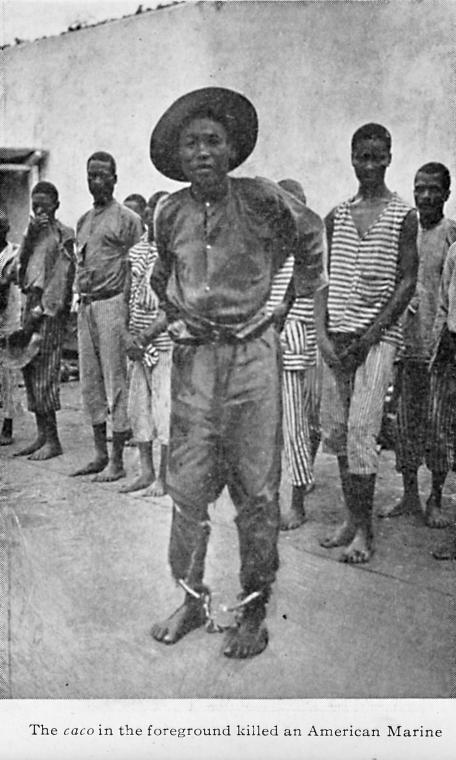
A great deal of this prejudice has been brought about because the Administration has seen fit to send southern white men to Haiti. For instance, the man at the head of the customs service is a man who was formerly a parish clerk in Louisiana. The man who is second in charge of the customs service is a man who was formerly Deputy Collector of Customs at Pascagoula, Miss. The man who is Superintendent of Public Instruction was formerly a school teacher in Louisiana. It seems like a practical joke to send a man from Louisiana where they have not good schools even for white children down to Haiti to organize schools for black children. And the mere idea of white Mississippians going down to civilize Haitians and teach them law and order would be laughable except for the fact that the attempt is actually being made to put the idea into execution.

These Southerners have found Haiti to be the veritable promised land of “jobs for deserving democrats”. Many of these men, both military and civilian officials, have moved their families to Haiti. In Port-au-Prince many of them live in fine villas. Many of them who could not keep a hired girl in the United States have a half-dozen servants. All of the civilian heads of departments have automobiles furnished at the expense of the Haitian Government. These automobiles seem to be used chiefly to take the women and children out for an airing each afternoon. It is interesting to see with what disdain, as they ride around, they look down upon the people who pay for the cars. It is also interesting to note that the Haitian officials and even the cabinet officers who are officially the superiors of these various heads have no cars. For example, the Louisiana superintendent has a car, but the Haitian Minister of Public Instruction has none. What the Washington Administration should have known was that in order to do anything worth while for Haiti, it was necessary to send men there who were able and willing to treat Negroes as men, and not because of their ability to speak poor French, or their knowledge of “handling niggers”.
The United States has failed in Haiti. It should get out as well and as quickly as it can and restore to the Haitian people their independence and sovereignty. The colored people of the United States should be interested in seeing that this is done, for Haiti is the one best chance that the Negro has in the world to prove that he is capable of the highest self-government. If Haiti should ultimately lose her independence, that one best chance will be lost.
Source:
James Weldon Johnson, “The Truth about Haiti. An N.A.A.C.P. Investigation.” Crisis 5 (September 1920): 217–224.
——————————————————————————————————————————–

Major General Smedley Butler
U.S commanding officer in Haiti
« I spent 33 years and four months in active military service and during that period I spent most of my time as a high class muscle man for Big Business, for Wall Street and the bankers. In short, I was a racketeer, a gangster for capitalism ».–Marine Corps Major General and two-time Medal of Honor recipient Smedley Butler, from his 1935 book War is a Racket
———————————————————————————
Cliquez sur la fleche pour voir la video
https://www.youtube.com/watch?v=h30FE0MxEMc&t=71s

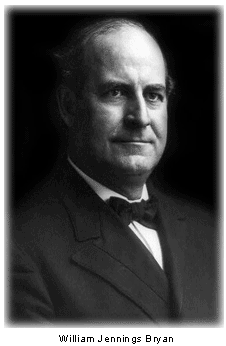




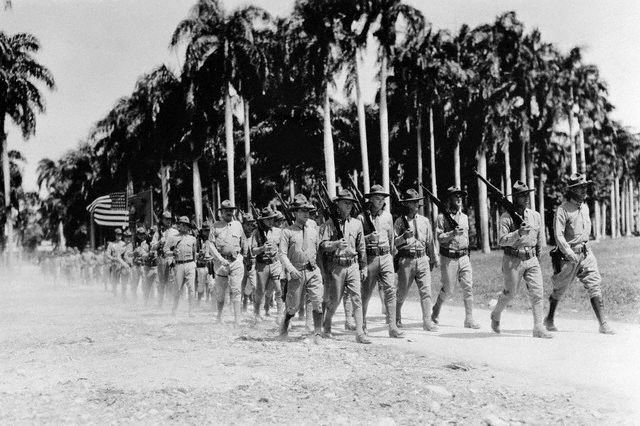



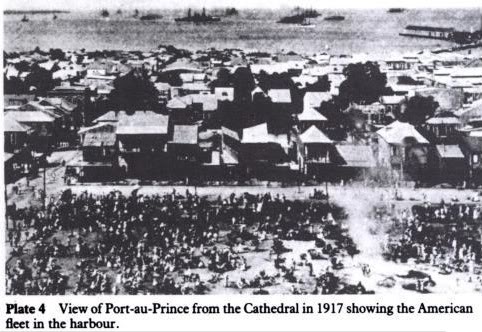
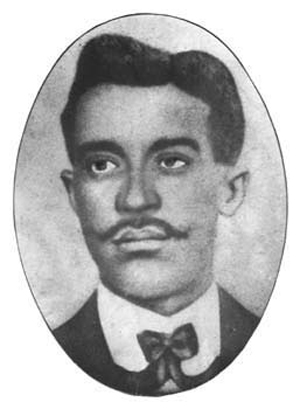



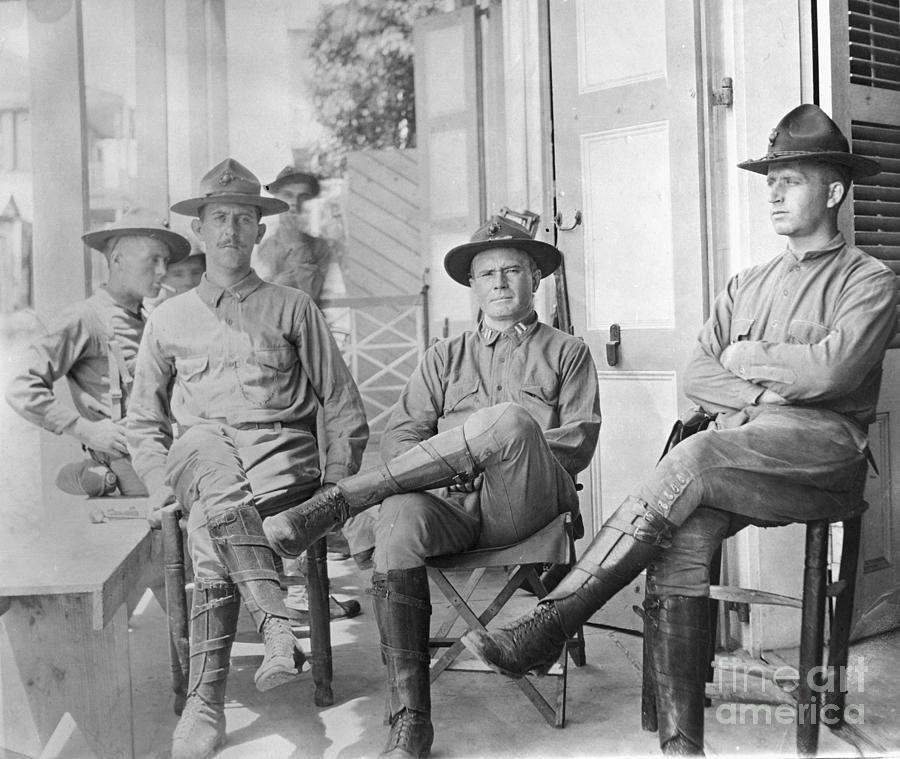
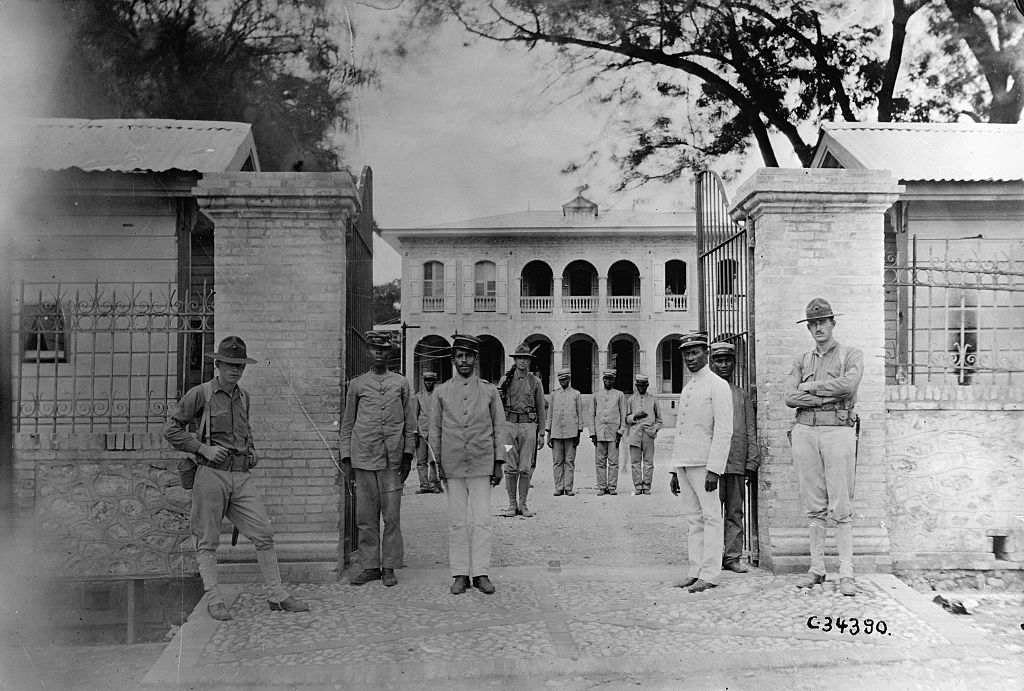

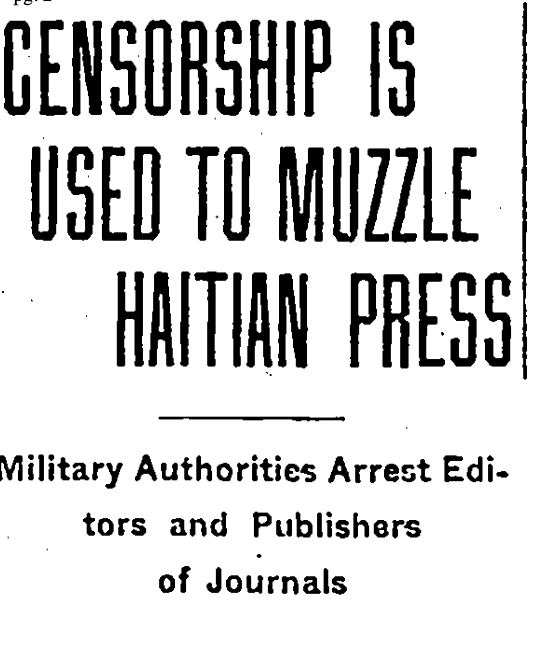
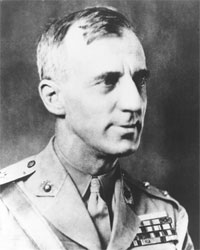







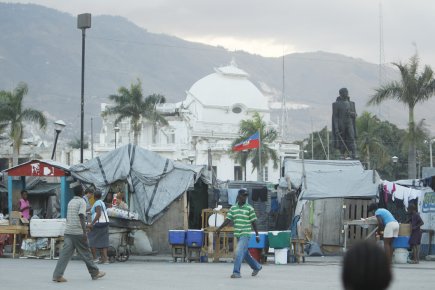





















































4 Réponses à “The Truth about Haiti: An NAACP Investigation in U.S occupied Haiti in 1920”